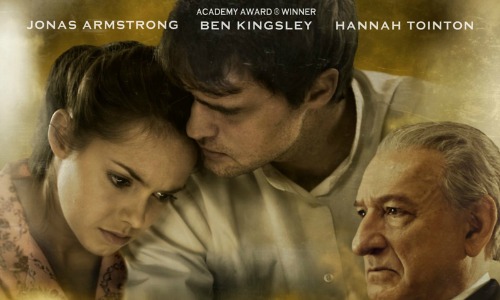‘Walking With the Enemy’ WWII Film Re-Released in Theaters
WWII is stock full of inspiring stories of selflessness, and the film “Walking with the Enemy” tells one of those heroic true tales — this one about a Hungarian man named Pinchas Tibor Rosenbaum (called “Elek” in the film) who stood up to the Nazis and risked everything to save the lives of others.
For those in New York City, fortune has smiled upon you: the film is being re-released in theaters in NYC beginning this Friday, Dec. 4. In honor of its re-release in the Big Apple, I am re-publishing my review of the film (which was very positive, as you might have guessed) below. Also, when you finish reading the review, you can read my interview with Rabbi Moshe Rosenbaum, the son of Pinchas Tibor Rosenbaum:
But before we get to my review, here are the details of the screenings:
Walking with the Enemy is a moving saga based on the true story of a Hungarian Jewish man who, after being torn from his family, goes to extraordinary lengths, even disguising himself as a German officer, to save thousands of Jews from the fire of Nazi hatred. Jonas Armstrong as the brave Elek captures the grieved but determined soul of the Hungarian Jewish people as they face impossible odds, and Ben Kingsley’s performance adds brilliant depth to an already sweeping historical epic. This movie will inspire you, but it will also bring mournful tears to your eyes — and rightly so — as it remembers what the Jews in Hungary endured during WWII.
Parental Guidance Issues at a Glance…
Sexual Content/Nudity: No nudity. One scene shows a German soldier capturing a young girl, forcing her into her parent’s bedroom in full view of her family held at gunpoint as they watch on with horror, and throwing her on the bed and beginning to remove his shirt with the intention of raping her. No other sexual content is seen. The film stays within its PG-13 boundaries. Some kissing between the protagonist and the young woman who is his love interest. Violence/Gore: Many deaths from gun violence, including detailed scenes of women, men, and children getting mowed down by machine guns as Germans and Hungarians from the Arrow Cross Party systematically kill Jews. A man’s leg cuts crushed by a large piece of wood. A man is beaten as soldiers try to torture him to extract information. Language: PG-13 mild profanity, not a large amount compared to many war movies, and no f-words. Alcohol/Drug/Smoking Content: Moderate amount of soldiers drinking, getting drunk, and smoking in war time situations.Frightening/Intense Content: Besides the scene with the young woman forced into a bedroom, which is the most frightening and disturbing scene, another scene shows German officers listening to the screams of Jews as they die in the gas chambers in Auschwitz. Overall, it is an intense film that deals with some very grave and disturbing subject matter from history, but it does so within the framework of PG-13 guidelines. (Review continues below)
Entertainment Value and Film Craft
Although critics felt the film lacked some pizzazz for its ambitiously long length and scope, the cinematography — handled by some of Hollywood’s finest veterans — was superb enough to cover over any weaknesses from first-time director Mark Schmidt, who, to be fair, conjured up a lot of magic from the script. This guy has talent, and I’m very curious to see his career going forward. His sense of story pacing and composition reminded me very much of classic movies — war movies from the ’30s and ’40s, when the culture wasn’t as ADD as ours (and, yes, Culturally-Induced ADD is a real thing). His directing style had a patient, calm feel to it. And for a debut film, Schmidt has some serious guts going for the epic WWII movie genre. In general, the film would have benefited from more ruthless editing and a more commercialized movie length with a snappier exposition-conflict-resolution, but history doesn’t always fit neatly into our little 1 hour 40 minutes windows of entertainment niceness. The film, after all, is based on a true story that was, frankly, very messy, tragic, and not at all a neatly tied, gift-wrapped package. I personally enjoyed the film because it had great moments of tension that threw you off balance, and it had some strong performances, especially that of Ben Kingsley, one of my favorite actors. Jonas Armstrong did a fine job conveying the dogged earnestness and virtue of the film’s hero; and Hannah Tointon, his brave love interest, stole most of her scenes with her wide range of very believable emotions as her character tried desperately to process all of the horror happening around her and respond with courage. The film featured an especially good supporting cast with stand-out performances. It was a very sad movie — because of its historical content — that moved me to tears in certain parts, but there was a determined, inspired spirit in it as well. As far as the overall movie experience, I’m not sure I can add it to the pantheon of all-time WWII movie greats, but I thought the critics were unfairly merciless in their reviews. It was a powerful, adept WWII epic that had some deeply felt emotions in its veins that were skillfully communicated.
Redemptive Value and Conclusion
Ultimately, the film unflinchingly depicts the devastation of Hungary Jews under Nazi oppression during WWII; but it is not all misery and tears. There is hope, there is bravery — even cooperation between faiths as Christians are seen protecting Jews — and it asks a question: would you continue hoping and fighting in the face of impossible odds? In that regard, this movie is an inspiration, and it is a worthy memorial to the Jewish people who died in WWII and to the brave man Pinchas Rosenbaum, upon whom the film is based.




